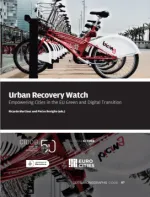Introduction: The urban dimension of an unprecedented EU funding mechanism

The unprecedented stimulus package of Next Generation EU, adopted by the European Council in 2020, comprises the set of measures put in motion at the EU level to address the crisis triggered by the COVID-19 pandemic. The remarkable amount of €723bn of its main funding instrument, the Recovery and Resilience Facility (RRF),1 aims simultaneously to overcome the economic fallout and promote the green and digital transitions – also defined as the twin transitions – at the heart of the European Green Deal (EGD), the blueprint towards climate neutrality by 2050 defined by the European Commission (EC) in 2019.
With 75% of European citizens living in cities, understanding and harnessing the urban dimension of the recovery process is key to unlocking the transformative potential of the policy measures adopted at the EU level in the face of the pandemic. As governmental actors, cities possess the political legitimacy and on-the-ground expertise necessary to ensure the transformations called for by the European institutions. From mobility and social cohesion to housing and innovation, the responsibility of city governments in services provision and infrastructures makes them fundamental allies in bolstering the just green and digital transitions at the heart of Next Generation EU.
Against this backdrop, the Global Cities Programme of the think tank CIDOB (Barcelona Centre for International Affairs) and the city network Eurocities, with the support of Barcelona City Council, have joined forces to gather evidence on how this new model of EU funding works for cities, and provide policy analysis and recommendations to boost the empowerment of city governments in the implementation of the RRF. This multi-year project seeks to promote the localisation of Next Generation EU, distilling key learnings that can amplify the role of cities in the EU recovery process and twin transitions, and, more broadly, bring the urban perspective into the debate on the future of EU funding instruments.